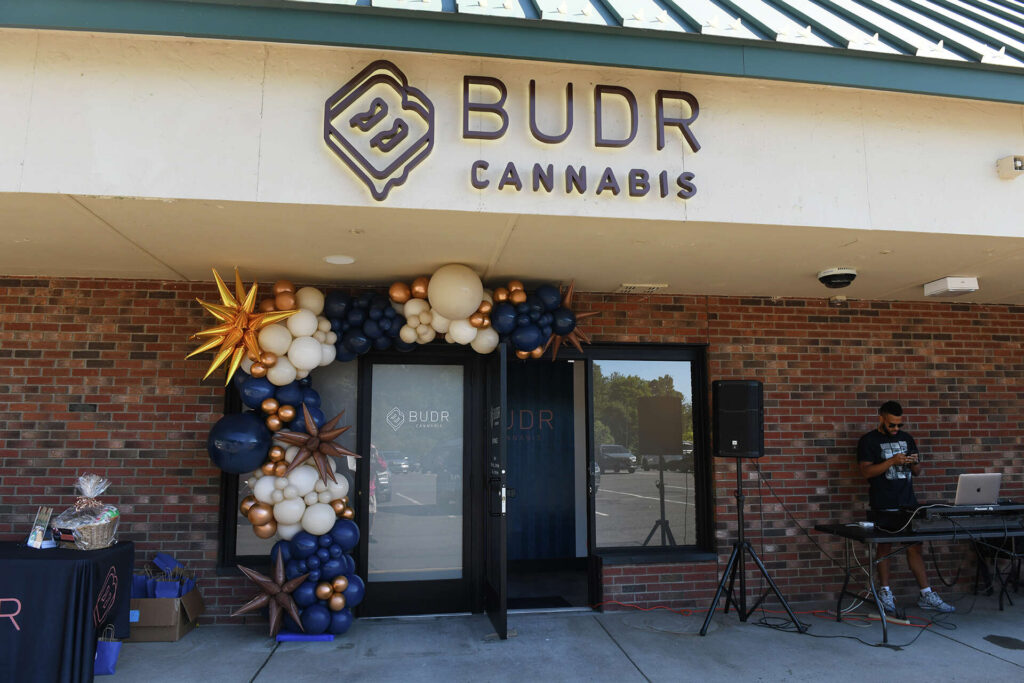BRIDGEPORT — Following a handful of failed attempts to gain approval to open a marijuana dispensary at the concert amphitheater, including a new rejection by the zoning appeals board, Budr Cannabis’ co-founder is done trying.
“It’s just a lost cause at this point,” said Carl Tirella Jr., who already has locations in neighboring Stratford, plus Danbury, West Hartford and Tolland.
Bridgeport land use regulations since 2022 allow recreational marijuana retailers in most of the city’s main business corridors. But Budr wanted to set up shop outside of those approved neighborhoods at the Hartford Healthcare Amphitheater, a city-owned, privately managed venue that opened at 500 Broad St. in 2021 on the outskirts of downtown.
The dispensary operators and their local attorney, Raymond Rizio, have argued the amphitheater is a perfect site for legalized recreational cannabis sales. The building is just off of Interstate 95, has plenty of parking and stands apart from the residential parts of the South End.
But, as previously reported, they repeatedly failed to convince members of Bridgeport’s appointed planning and zoning and zoning appeals boards over the past year. Last December the latter entity turned down the dispensary’s request for a variance to operate out of the amphitheater in a close three to two vote. At least four “yes” votes were required.
So Budr tried a different approach and this past August asked the Planning and Zoning Commission to amend Bridgeport’s land use rules to allow recreational marijuana to be sold at the amphitheater. That effort too failed, eight votes to zero with one abstention.
And then, after some delays, it was back to the Zoning Board of Appeals this past Tuesday. Tirella in an interview in September said Budr had worked hard to garner support from municipal elected officials and to address any lingering concerns and he was hoping that would garner the necessary votes. But the effort did not pay off and Budr’s application was again rejected, this time unanimously.
Specifically appeals board members concluded Budr failed to prove that its business was experiencing a zoning “hardship” by being unable to access the amphitheater even though other retail sales of food, beverages and various items occur there during shows. Budr would have been open on a daily basis, not just during concerts.
“I don’t anticipate any appeal (in court),” Rizio said, adding he has been “really disappointed” in zoning officials’ response to his client’s applications.
“I really truly think (the amphitheater is) the appropriate place for this type of activity,” Rizio continued. “It is exactly where a retail cannabis operation should be.”
Recreational cannabis has been legal under Connecticut law since 2021. In the fall of that year Bridgeport zoning officials initially relegated any future businesses to industrial areas of the city where adult entertainment like strip clubs is also relegated. Then in the summer of 2022 that local regulation was expanded commercial strips.
The city currently has two cannabis shops: Affinity, which began operating last winter, and Higher Collective, which opened in October.
Others have been authorized but so far not launched.
Bridgeport City Councilman Jorge Cruz, whose district includes the amphitheater, said he was very upset that Budr has been rejected given its latest application enjoyed support from himself and other neighborhood leaders.
“It was wrong. It was unfair,” Cruz said Friday.
State Rep. Steven Stafstrom, D-Bridgeport, who lives in the Black Rock section of town was a key supporter of the state’s law backing dispensaries and had previously been critical of Bridgeport zoning officials’ initial attempt in 2021 to severely limit their locations.
“I don’t really have a strong feeling on (Budr),” Stafstrom said Friday. “Certainly when I was drafting the (state) legislation we really weren’t thinking about dispensaries being located inside an existing venue. … It seems like a fairly novel concept in Connecticut. Most of the discussions at the legislative level in drafting the bill were that the dispensaries would predominantly be freestanding storefronts akin to a package store. Not to say something like this concept couldn’t be done, but it wasn’t the main concept.”
Tirella said Budr will continue to provide delivery service to Bridgeport patrons from its Stratford location and, subsequently, the city will miss out on the state-required share of revenues that would have been generated within its borders at the amphitheater.
“The tax revenues (will) be going to the town of Stratford instead,” he said.
H/T: www.ctpost.com



